This list of free marketing tools for therapists is one I originally put together for a few colleagues who were graduating at the same time as me and about to start their own private practice.
It’s since been updated and revised to provide you with the very best low and no-cost software every therapist should be using to grow their online presence and attract new clients.
Enjoy!
Free Marketing Tools for Therapists: Images and Design
1. Canva
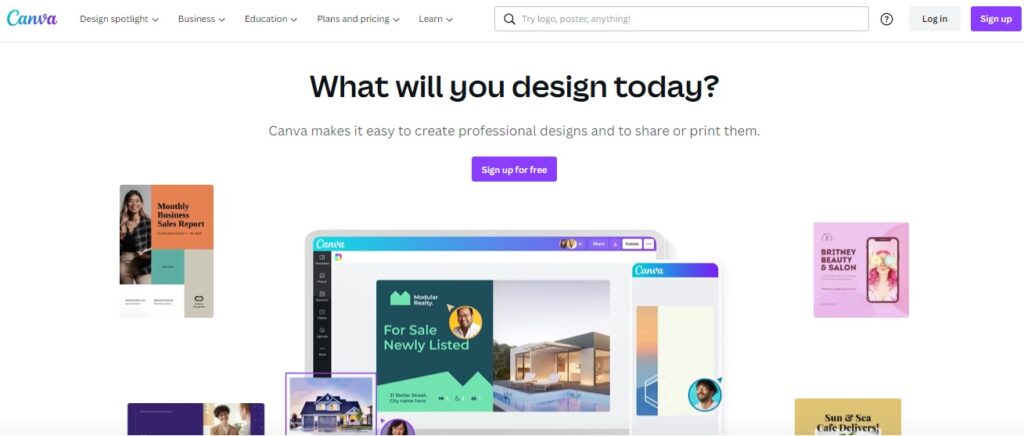
Canva is a free, beginner-friendly graphic design tool that makes it easy to create everything from a therapy practice logo to social media posts, business cards, brochures, and more.
Admittedly, I pay for the upgraded Canva Pro package, but even if you stick with the free version, you’ll have access to thousands of customizable templates and design options, making this an indispensable tool for any therapist taking a DIY approach with their marketing.
2. Pixabay
Pixabay is a stock photo site where you can find free images for your blogs, social media posts, and other online content.
Although it’s always better to use unique images in your marketing materials, Pixabay can come to the rescue if you’re struggling to find the right image.
3. Unsplash
Didn’t find what you want on Pixabay?
You’ll find more free stock photos on Unsplash.
The quality of the images is about the same on both platforms, though I do find that Unsplash does a better job of matching search queries with the most relevant results.
Free Blogging Tools for Therapists
4. Medium.com

Blogging is an excellent way to establish your credibility as a therapist, boost brand awareness for your practice, and increase your visibility in search engines.
While I definitely recommend posting blogs on your therapy practice website to improve your search engine optimization (SEO) efforts, I also Medium.com.
Medium is a free blogging platform with an enormous, in-built audience of readers who spend a combined total of 4.5 million hours reading articles every month.
All this means that, as a new therapist, the platform can be a more effective way of growing an audience and showcasing your expertise than your own site.
The best part is that Medium bloggers with 100 followers or more can also enroll in the Medium Partner Program and earn money when people read their content. This could make it a great option for diversifying your income streams as a self-employed therapist.
To see the kind of content you can create, follow me on Medium.
5. SemRush Keyword Magic Tool
One of the most essential free marketing tools for therapists who care about their SEO game, the free Keyword Magic Tool from Semrush is invaluable for starting your keyword research to appear in search results when your ideal clients search for terms relating to your therapy practice.
Free Website Tools
6. WordPress
There are two different versions of WordPress, hosted and self-hosted.
Self-hosted means that you download the free software and upload it to a web-hosting server so that you can use it to build websites and blogs. Hosted means that the software is already installed for you, saving you the hassle of managing the technical side of running a website.
Both are available for free, though you’ll still need to pay for things like a domain name for your therapy practice and, for self-hosted WordPress, some quality web hosting.
7. Let’s Encrypt
Get a free SSL certificate from Let’s Encrypt.
In a basic sense, SSL is the thing that changes http to https, but there’s much more to it than that.
All websites need an SSL certificate, which a piece of encryption technology that means information exchanged between your website and its visitors (such as credit card payments) is exchanged securely.
It’s important if you’re planning to accept payments online.
Even if you’re not, it’s still important because Google uses it as a ranking factor, listing websites with SSL certificates higher in the search results than those without it.
Some domain registrars will give you a free SSL when you buy your web address, though most charge. Let’s Encrypt lets you use one for free.
Email and Social Media Marketing Tools for Therapists
8. MailChimp

MailChimp makes it easy to build an email list and send out regular email newsletters.
Email marketing consistently proves to be one of the most effective ways for businesses to generate sales, so it’s always worth incorporating it into your therapy practice marketing strategy.
9. Snip.Ly
Snip.Ly is an awesome tool that adds a Call to Action (CTA) to any articles you share on social media.
Let’s say you find a useful article on The Guardian’s website about treating anxiety, and you want to share it with your social media following. You do so, but all that does is drive traffic to The Guardian with no payoff for you.
When you use Snip.Ly to share that same article, it will attach a CTA to the article, which encourages anyone who clicked the link to visit your website after they’re done reading.
Clever, right?
10. Tweetdeck
Tweetdeck is great for scheduling all of your Twitter posts in advance.
If you’re anything like me and you want to use Twitter to grow your business but forget to check it every single day, the ability to schedule your tweets in advance means you’ll still be active on the app even if you don’t physically log in.
11. Hootsuite
If you like the idea of scheduling your content in advance but you use other tools besides Twitter, Hootsuite may be the one for you.
This complete social media management platform offers a free plan which allows you to schedule up to 30 posts at a time on up to three different social media platforms, making it a great for short-term social media campaigns.
Best Free Automation Tool
12. IFTTT
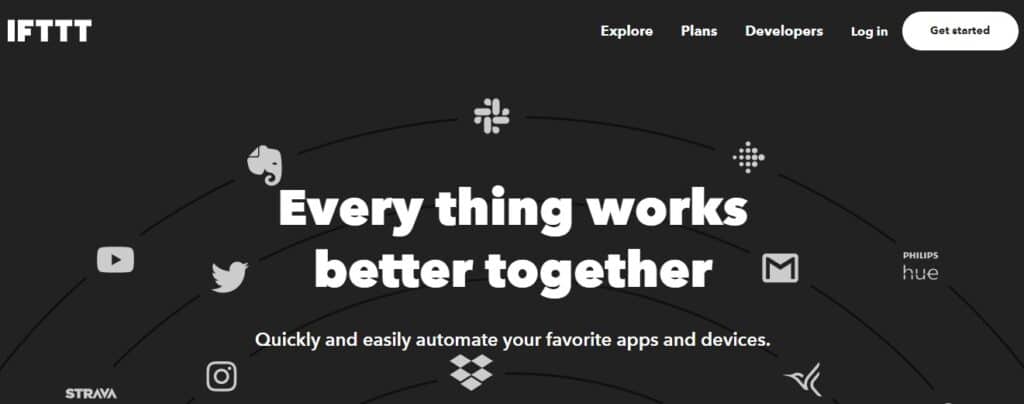
IFTTT (If This Then That) has loads of “recipes” for making different tools work together.
For example, I have one that, every time I share a picture on Instagram, cross-posts the image to Twitter and also pins it to a Pinterest board.
Best Free Site Performance and Analytics Tools
13. Google Page Insights
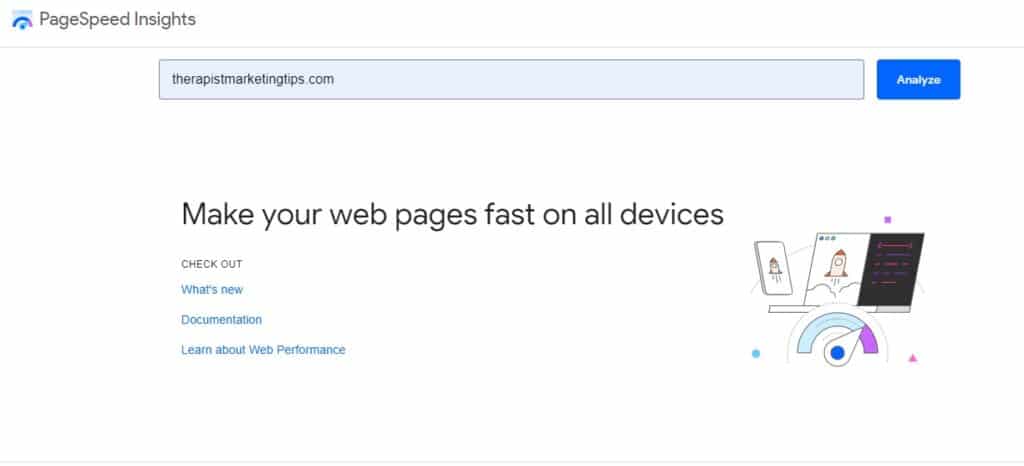
Site speed and performance are among the most critical factors that Google looks at when deciding where to rank your site in its search results. The faster your site loads, the higher it ranks.
Google’s free Page Insights Tool will give you a score that tells you how your site is performing.
If you’re hiring someone to build your website for you, ask them about site speed, and don’t let them fob you off.
A slow, poorly performing site is no good for anyone. Think about any time you’ve gone on a website that takes ages to load – you just get fed up and leave.
You certainly don’t want your potential therapy clients doing the same.
14. Google Analytics
Look, I’ll be honest with you:
I find any kind of data analysis to be incredibly boring, but I can’t deny that Google Analytics is essential, and I still end up checking it on a regular basis.
The popular free analytics tool provides you with valuable information about how your website pages and blog posts are performing, which content generates the most traffic and even the terms people search for on Google that leads them to your content.
Once you have all this data to hand, you can make smart decisions about what to focus on when it comes to adding more content and improving your website.
Best SEO and Content Marketing Tools for Therapists
15. Grammarly
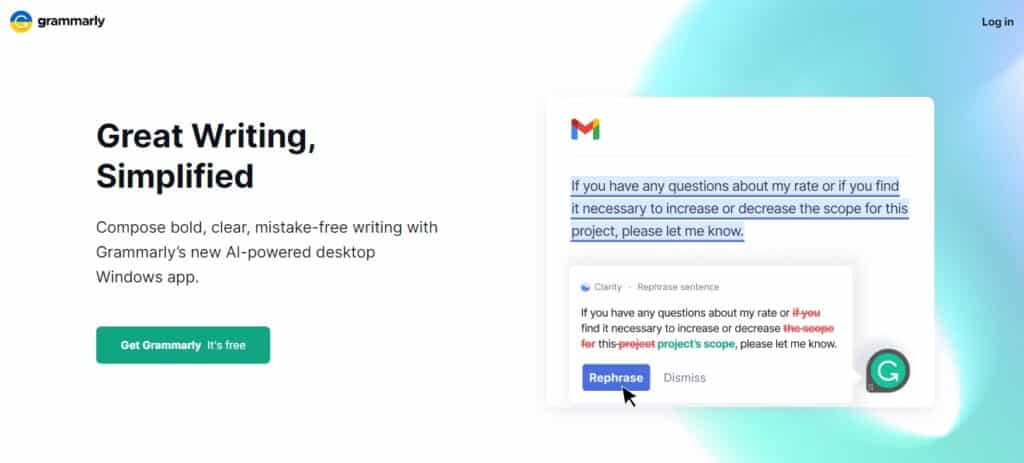
Grammarly is a free tool that highlights grammar, spelling, and punctuation mistakes in your text. It also offers useful suggestions to improve your content.
It’s not always perfect and will occasionally flag mistakes where there aren’t any, but, on the whole, it’s a decent tool for anyone who takes their writing seriously.
16. Headline Analyser
The headlines of your articles/blog posts make a big difference in how they perform SEO-wise.
Headline Analyser tells you how good your headlines are and, where applicable, offers suggestions to improve them.
17. Piktochart
Piktochart is an excellent tool for creating infographics and other visual content that you can then add to your blogs and social media profiles.
The platform also offers templates for creating brochures and other marketing materials, making it an ideal alternative to Canva.
Although you’ll get the most out of Piktochart by paying for the premium version, the platform’s free plan is still an excellent marketing tool for therapists on a budget.
Miscellaneous Free and Low-Cost Marketing Tools
18. Bit.ly
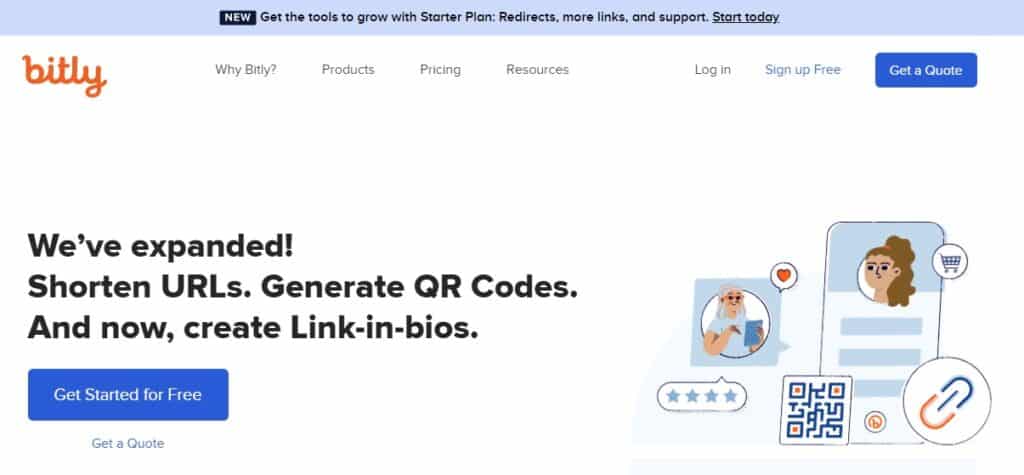
Bit.Ly is a popular URL shorter that proves very helpful if you want to send someone a long and complicated link or if you’re trying to share a post on Twitter and find the URL eats up all your word count.
19. JotForm
great for building free forms. Jotform is You could use it for a contact form, a survey, or a self-referral type form and either embed it on your website or just send someone the link to the form.
20. Visme
Giving a presentation at an event?
Using Visme is a great way to avoid the same old, boring PowerPoint templates and create slides that are every bit as compelling and engaging as your talk.
21. Legiit
If you’re looking to hire freelancers to help you with your marketing, Legiit is an excellent free platform that vets and tests its freelancers so that you can be sure you’re hiring someone who’s more than up to the task.
What are Your Favourite Free Therapist Marketing Tools?
Are you using an awesome free tool to market your therapy practice that I didn’t include here?
I’d love to hear about it!
Be sure to share it with me and other Therapist Marketing Tips readers in the comments below.
Enjoyed this post? Get more marketing advice for therapists every week by following Therapist Marketing Tips on Facebook.




![Propel Booking App for Shopify Review [2024]](https://therapistmarketingtips.com/wp-content/uploads/2024/08/Propel-Booking-App-for-Shopify-506x380.png)
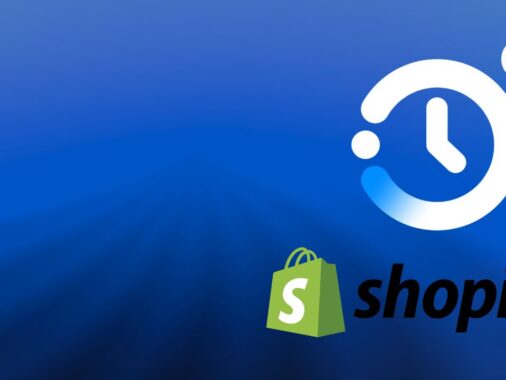
Comments are closed.